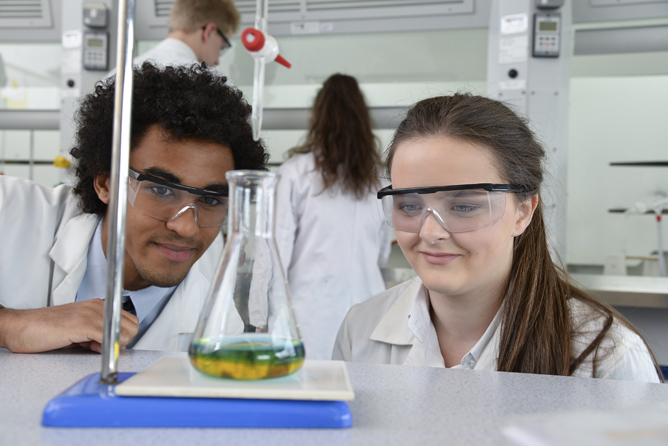Chemistry is the science which bridges the gaps between most other sciences, be they physical or biological.
It answers questions such as: "How do chemicals react?" and "Why when combined, do some chemicals go 'Bang!' while others largely ignore one another?" Without chemistry, there would be no new drug developments, indeed no new materials of any kind, whether for fashion or for stopping a speeding bullet.
In short: Chemistry = Essential Science.
Why Chemistry?
Chemistry helps us to understand the world in which we live, from the way our bodies work to the effects on our environment of human activity. It is an interesting subject even if you don't intend to use it as a stepping-stone, and it complements many other subjects, particularly Biology and Physics but also Maths, Geography and Geology. Chemistry is an essential A-level for a host of degree courses, including Medicine, Veterinary Sciences, Pharmacy and Dentistry.
Any special requirements?
If students have taken Separate Sciences at GCSE, they must have achieved grade 6 or above in Chemistry plus one other from Biology or Physics. If students have taken Combined Science at GCSE, it is desirable that students have achieved grade 7 or above. As the maths content of the new A-level course is quite substantial, students should also have at least a grade 6 in GCSE Mathematics.
What will I study?
Year One:
- Electrons, Bonding and Structure
- The Periodic Table
- Quantitative chemistry - reactions and calculations
- Organic chemistry
- Thermodynamics - energy changes
- Rates and equilibrium
- Environmental Chemistry
Year Two:
(all the above plus the following)
- Synthesis, including Polymers
- Analytical techniques
- Thermodynamics
- Kinetics, Equilibrium and pH
- Electrochemistry and Redox
- Transition Elements
How will I be assessed?
Year One:
(Both papers cover content from all four modules)
Paper 1 - Breadth in Chemistry (50%)
Paper 2 - Depth in Chemistry (50%)
Year Two:
(All three papers cover different parts of the course)
Paper 1 - Periodic Table, elements and physical chemistry (37 %)
Paper 2 - Synthesis and Analytical techniques (37 %)
Paper 3 - Unified Chemistry (26 %)
Non-exam Practical Endorsement - Pass or fail based on practical competence and portfolio throughout the course.

Purpose and Provision
Download a copy of the Science Departments Purpose and Provision document here.
Curriculum Map
Download a copy of the Science Departments Curriculum Map document here: Key Stage 5